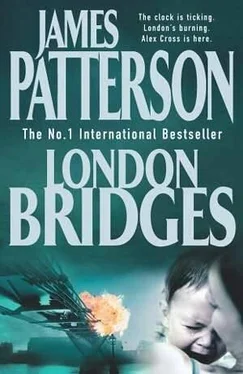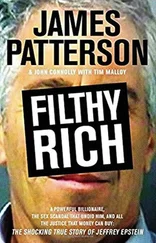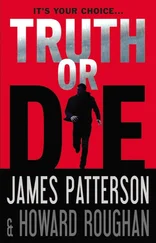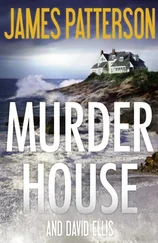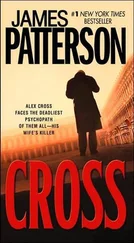I went back to the Relais and suddenly wished that I hadn't asked for a room facing the street. My body felt numb all over, exhausted, but my mind wouldn't stop racing at warp speed. The noise rising from the street was a disturbance that I couldn't handle right now. They have nuclear weapons. This isn't a bluff. It's going to happen. A holocaust.
I decided to call the kids at about six o'clock, their time. I talked to them about all the things in Paris that I didn't see that day-everything except what had really happened to me. So far, the media had none of it, but that wouldn't last.
Then I called Nana. I told her the truth about how it had felt sitting on the pavement with a bomb attached to my wrist. She was the one I always told about my worst days, and this was probably the worst of them all.
When I arrived at my small office at the Préfecture I got another surprise. Martin Lodge was waiting there for me. It was 7:15: ten hours and forty-five minutes to doomsday.
I shook Martin's hand, and told him how glad I was that he was there. "Not much time left. Why are you here?"
"Last words, I suppose. I have to give the final update on the situation in London. As well as Tel Aviv. From our vantage point, anyway."
"And?"
Martin shook his head. "You don't want to hear the same rotten story twice."
"Yeah. I do."
"Not this story, you don't. Oh hell, it's all cocked up, Alex. I think he might have to blow up a city to get them to act. That's how bad it is. The worst is Tel Aviv. I think it's basically hopeless there. They don't make deals with terrorists. You asked."
The morning briefing started at eight sharp and included a quick summary on the briefcase bomb from the technicians who had taken it apart. They reported that the bomb was authentic in design, but there was no neutron emitter, no trigger, and possibly not enough radioactive material inside.
An army general spoke about the current situation in Paris: the people were frightened and staying off the streets, but only a small percentage had actually fled the city. The army was prepared to move in and declare martial law about the time of the deadline, which was sixP.M.
Then it was time for Martin. He strode to the front of the room and spoke in French. "Good morning. Isn't it incredible what can happen once we adapt ourselves to a new reality? The people of London have been splendid, for the most part. Some rioting. Not too much in terms of what could have happened. I suspect that those who might have given us the most trouble got out of London early. As for Tel Aviv, they're so accustomed to crisis and living under threatening scenarios-let's just say that they're handling this very well.
"Anyway, that's the good news. The bad is that we've raised most of the money, but not all of it. That's in London. And Tel Aviv? As best we can tell, they're not going to make a deal. The Israelis hold their cards very close to the vest, so we're not sure what's transpired there.
"We're putting on pressure, of course. And so is Washington. I know that private individuals have been approached to put up the entire ransom. That could still happen. But it isn't clear if the government will take the money. They simply don't want to meet terrorist demands.
"Less than ten hours," Martin Lodge said. "To be blunt, we don't have time for a lot of bullshit. Somebody has to drop the hammer on anyone who's resisting paying the ransom."
A policeman had come up to me and was whispering against my ear. "Sorry. You're needed, Dr. Cross."
"What is it?" I whispered back. I wanted to hear everything that was being said in this meeting.
"Just come. It's an emergency. Right now, please."
I knew that, ironically, an "emergency" had to be considered good news at this point in the countdown. At 8:30 that morning I was inside a speeding police cruiser, the blare of its siren disturbing the peace all along our route across Paris.
My God, the streets were bleak and deserted. Except for soldiers and the police, anyway. My part in an ongoing interrogation was explained to me during the ride. "We have an arms dealer in custody, Dr. Cross. We have reason to believe that he helped supply the bombs. Maybe he's one of the men who you saw out in the country. He's a Russian-with a white beard."
Minutes later we arrived in front of the Brigade Criminelle, a dark, nineteenth-century building in a quiet neighborhood along the Seine. Actually, this was the infamous " La Crim " from countless French movies and police stories, including several about Inspector Maigret that Nana and I had read together when I was a kid. Life imitates art, or something like that.
Once inside La Crim I was led up a rickety staircase, all the way to the top floor, the fourth. The interrogation was being conducted up there.
I was brought down a narrow hallway to room 414. The brigadier who escorted me knocked once, and then we stepped inside.
I recognized the Russian arms dealer instantly.
They had caught White Beard, the one who'd told me he was the Wolf.
The room was small and cramped, as it was situated right under the eaves. It had a low, rain-stained, sloping ceiling and a tiny Velux, a skylight. I looked at my watch-8:45. Tick, tick, tick.
I was hurriedly introduced to the interrogation team of Captain Coridon and Lieutenant Leroux-and their prisoner, a Russian arms dealer, Artur Nikitin. I already knew Nikitin, of course. He wore no shirt or shoes and was cuffed, hands behind his back. He was also sweating profusely. He was definitely the white-bearded Russian from the farmhouse.
I had been told during the ride over that the Russian hoodlum did business with al Qaeda that had made him millions. It was believed that he was involved with suitcase nukes, that he knew how many had been sold, and that he knew who had bought them.
"Cowards!" he was shouting at the French police as I entered the room. "Fucking goddamn cowards. You can't do this to me. I've done nothing wrong. You French claim to be such liberals, but you are not!"
He looked at me and pretended he had no idea who I was. His bad acting made me smile.
Captain Coridon told him, "You may have noticed that you have been brought to the Préfecture de Police rather than the offices of the DST. That's because you're not being charged as an 'illegal trafficker in arms.' The charge is murder. We are homicide detectives. Trust me, there are no liberals in this room, unless it's you."
Nikitin's brown eyes remained wide with anger, but I also detected traces of confusion, especially now that I was there. "This is bullshit! I can't believe it. I've done nothing wrong. I am a businessman! A French citizen. I want my lawyer!"
Coridon looked at me. "You try."
I stepped forward and threw a hard uppercut into the Russian's jaw. His head snapped back. "We're not even close to being even," I told him. "No one knows that you're here! You will be tried as a terrorist, and you will be executed. No one will care, not after tomorrow. Not after your bombs help destroy Paris and kill thousands."
The Russian yelled at me. "I tell you again-I've done nothing! You can't do anything to me. What weapons? What bombs? Who am I, Saddam Hussein? You can't do this."
"We can, and we will execute you," shouted Captain Coridon from off to the side. "You are a dead man as soon as you leave this room, Nikitin. We have other scum to talk to. Whoever helps us first, we help them."
"Get him out of here!" Coridon finally said. "We're wasting time with this bastard!"
The brigadier grabbed Nikitin by his hair and by the band of his pants. He threw him halfway across the room. The Russian's head smacked against the wall, but he scrambled to his bare feet. His eyes were large and fearful now. Maybe he was beginning to understand that the rules of interrogation had changed. Everything had changed now.
Читать дальше
